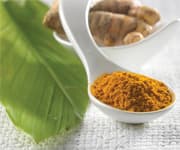Life Extension Magazine®
For thousands of years, turmeric root has been used as a traditional Indian medicine.
The turmeric spice, which gives curry its golden color, has been recognized for wide-ranging health benefits.1-5
The most beneficial compounds in turmeric are curcuminoids, which include curcumin and related compounds.
One animal study showed lifespan extension up to 26% with curcumin supplementation.6
But there’s been a major problem that limits practical use: curcuminoids have poor oral bioavailability.
That means a large portion of curcumin taken orally never gets absorbed into the bloodstream and doesn’t reach the tissues.
Scientists have made a major advance in solving this problem. They’ve perfected a patented form of curcumin that dramatically boosts its bioavailability.
This allows more curcumin to circulate throughout the body for a longer time.
For the first time, people have the opportunity to realize the potential of curcumin to benefit whole-body health, slow certain aging processes, and reduce risks for age-related disorders.
Major Advance in Curcumin Bioavailability
In its pure form, curcumin is poorly absorbed into the bloodstream and is quickly metabolized into inactive forms or eliminated from the body.7
Normally, much of ingested curcumin is rapidly conjugated in the intestines and liver, which means it attaches to another compound. When this happens, most ingested curcumin is not biologically active and very little makes it into the body’s tissues. Studies show that only free curcumin, which remains unconjugated, is bioactive.
In a major advance, scientists used a water extraction process and combined curcumin with components of another traditional Indian medicinal spice, fenugreek. The fenugreek seed contains a unique form of fiber, known as galactomannan, which helps protect curcumin from modifications in the gut and greatly increases its bioavailability, or absorption into the bloodstream.
This novel formulation of curcumin, boosting its bioavailability and efficacy, has been validated in laboratory studies and human trials.

What You Need to Know
New, Highly Bioavailable Curcumin
-
Animal and clinical human studies have shown that curcumin, the active compound in turmeric root, has a beneficial impact on lifespan extension, weight loss, cardiovascular health, arthritis, protection from neurodegenerative diseases, cancer prevention and treatment, depression, and more.
-
Pure curcumin supplements have low bioavailability. They are poorly absorbed and rapidly eliminated from the body.
-
A novel, patented technology combining curcumin with components of fenugreek seeds called galactomannans boosts the bioavailability and tissue distribution of bioactive free curcumin far beyond that of other commercially available supplements.
-
The new supplement has been shown in human studies to lead to an increase of bioactive free curcumin in the blood at a level more than 45 times greater than in those who took unformulated curcumin alone (a regular turmeric extract standardized to 95% curcuminoids).
-
These high levels of free curcumin also circulate in the body longer, allowing for the uptake of curcumin into tissues where it can deliver its whole-body, health-promoting effects.
Improved Bioavailability Demonstrated
Researchers tested the new curcumin-galactomannan combination’s ability to enhance the bioavailability of curcuminoids in human volunteers.8 Fifty healthy adults were randomized to receive curcumin from either the new formulation or from a standardized curcumin extract.
The results showed that people who took the new formula had levels of free curcuminoids in the blood more than 45 times greater than those who took pure curcumin alone.
With the new formulation, more than 70% of the curcuminoids remained in the free, bioactive form even five hours after ingestion, allowing it to beneficially permeate tissues throughout the body.
An animal study also evaluated bioavailability and tissue penetration of the new curcumin formula.9 Like the human study, it demonstrated a major increase in blood levels of free curcuminoids and found that they remained in the bloodstream longer.
This study, done on rats, was able to delve deeper. By testing various organs following supplementation of the animals with this new curcumin, the researchers evaluated the penetration of free curcumin into various tissues. Brain, heart, kidney, and spleen levels were all dramatically enhanced compared with a standard curcumin supplement.
In the brain, curcumin from a standardized turmeric extract only penetrated the tissue in small amounts. With the new formulation, levels of free curcuminoids in the brain were 245% higher. This is vital, since curcumin is known to be one of the most neuroprotective compounds found in turmeric, helping to reduce the risk for age-related brain degeneration and cognitive decline.10
Together, the findings from the animal and human studies show that this new curcumin formulation significantly enhances its ability to circulate and work throughout the body.
Human Studies of the New Formulation
Multiple human studies have recently been done on the impact of this new curcumin-galactomannan supplement on various ailments. The following are among the impressive results:
-
A study of 60 healthy adults found that the new curcumin supplement improved markers of oxidative stress, while symptoms of anxiety, stress, and fatigue were reduced.11
-
One study of young, obese men found that curcumin-galactomannan improved cardiovascular risk factors. There was a 34% increase in HDL (“good”) cholesterol and a 29% reduction in harmful levels of homocysteine, an amino acid linked to development of heart disease.5
-
In two other studies, there was also significant improvement in measures of arterial stiffness, a risk factor for cardiovascular mortality.12,13
-
In alcoholic adults, the new supplement led to an average 30% reduction in markers of liver damage, an approximately 25% increase in antioxidant status, and a reduction in markers of systemic inflammation, including an approximately 27% reduction in C-reactive protein (CRP).1
-
In human blood cells, the supplement blocked the production of nuclear factor-kappa B (NF-kB), which is associated with harmful, chronic inflammatory responses. It also protected the cells by reducing dangerous free radicals.14
Extending Healthy Lifespan

By improving the absorption and tissue distribution of free curcumin, it is now possible to maximize its benefits in fighting specific diseases. Perhaps the most remarkable ability curcumin has shown in research is to enhance longevity and prolong lifespan.
In animal studies, curcumin supplementation leads to longer life.6,15-18 For example, a study of curcumin supplementation in fruit flies resulted in as much as a 26% extension of average lifespan.6
How does it work? In studies of longevity, a handful of key mechanisms keep coming up. Each of the following has repeatedly been shown to help slow the aging process and extend healthy lifespan:2-4,19-22
- Reducing chronic, low-grade inflammation,
- Increasing activity of sirtuins, specialized proteins that regulate cellular health,
- Decreasing activity of mTOR, a protein associated with rapid aging and cancer,
- Enhancing activity of the enzyme AMPK, which improves metabolism,
- Boosting autophagy, the cellular “recycling” process that helps keep cells rejuvenated, and
- Protecting against tissue damage caused by glycation, when sugars attach to proteins and fats.
Curcumin positively affects every one of these targets.
Curcumin’s Effects on the Diseases of Aging

Curcumin has also been shown to be beneficial against many specific diseases and conditions. Among them are some of the most common and well-studied disorders, including the following:
Neurodegenerative Diseases
Promising research shows that curcumin has protective effects against amyloid proteins, especially beta-amyloid and tau. A buildup of these sticky proteins is associated with several age-related neurodegenerative diseases and dementias, including Alzheimer’s disease.23-29
In one study, curcumin supplementation in healthy, older adults resulted in immediate and long-term improvements in cognition, compared to a placebo.30 Both attention and working memory tasks improved within one hour of intake, and tests of memory and mood showed long-term improvements as well.
Another study in older adults taking curcumin also demonstrated improvements in attention and memory.31 This study used PET scanning to evaluate the buildup of amyloid and tau in the brain over a period of 18 months. Scientists found that these accumulations were reduced or remained stable in the supplemented participants, but they tended to worsen in the group that did not receive curcumin.
Cancer
In addition to reducing chronic inflammation and oxidative damage caused by free radicals, both of which contribute to the development of cancer, curcumin has been shown to have anti-cancer effects. It helps prevent the formation of tumors, induce cell death in existing cancer cells, and block their spread in the body.32-34
In a study on a strain of hairless mice, curcumin protected against the formation of skin cancer, even when the mice were exposed to UV radiation that would normally cause tumors.35
In cell cultures and animal studies, curcumin has shown very promising results in reducing growth and causing cell death in various types of cancer.34
Obesity
Being overweight increases the risks of developing conditions like heart disease, stroke, cancer, and diabetes. Obesity also creates excess inflammation in the body, accelerating the aging process.36
By improving metabolic function and reducing inflammation, curcumin helps ameliorate some of these effects. It has also been found to aid in weight loss, as seen with calorie-restricted diets and exercise.
A recent meta-analysis of 876 subjects randomized to receive curcumin supplementation showed a significant reduction in both body weight and body mass index (BMI).37 On average, subjects lost about 2.5 pounds with curcumin supplementation alone.
Metabolic Syndrome
Metabolic syndrome refers to a group of disorders, including elevated levels of blood sugar, abnormal lipid profiles, high blood pressure, and excess belly fat.38 They can lead to type II diabetes and are risk factors for atherosclerosis, heart attack, and stroke.
Curcumin has a powerful impact on metabolism, helping to reduce many of these risk factors.
A recent clinical trial evaluated a curcumin supplement in overweight adults with elevated glucose levels.39 After eight weeks, many positive changes in markers of metabolic health were noted. Fasting insulin levels, waist circumference, blood pressure, triglycerides, and markers of liver damage were all reduced significantly, while HDL (“good”) cholesterol was elevated.
Cardiovascular Disease
Curcumin protects the heart and blood vessels in numerous ways. As noted, it can reduce risk factors for cardiovascular disease, like obesity, high blood pressure, and abnormal blood lipid levels.
Curcumin also does much more. Research has shown that it can reduce pathological changes in the blood vessels and heart that contribute to atherosclerosis, aneurysm formation, and heart dysfunction.40 And when a cardiovascular event like a heart attack or stroke does occur, curcumin can lessen the impact.
Arthritis
A powerful anti-inflammatory, curcumin is a way to treat painful ailments related to inflammation. One of the most common of these conditions is osteoarthritis, the degenerative joint disease that occurs frequently in older age.41
A recent analysis of several studies found that, on average, pain due to arthritis was reduced by curcumin supplementation.42 The WOMAC Index score, widely used in evaluating hip and knee osteoarthritis, was also reduced. That indicates improvement not only in pain control, but also in joint stiffness, limitations of physical functioning, and other symptoms.
Some of these studies compared curcumin to pain medications typically used for arthritis, particularly nonsteroidal anti-inflammatory drugs (NSAIDs) like ibuprofen. They found that there was no significant difference in pain control between curcumin and these medications. This is an important finding, since prolonged use of NSAIDs is associated with significant side effects, including gastritis, ulcers, and even kidney damage. In comparison, curcumin is generally considered safe, even at relatively high doses.
Depression and Anxiety
Several studies have found that curcumin can help control symptoms of major depression.43
One study randomized patients to receive either 1,000 mg of curcumin daily or fluoxetine (Prozac®).44 At the end of six weeks, those receiving curcumin had the same response rate to treatment as those receiving the drug, which can cause many side effects.
Some of these studies also evaluated symptoms of anxiety and found a positive response with curcumin as well.43
Curcumin’s Many Mechanisms
Most pharmaceutical drugs act by only one or two mechanisms in the body. Curcumin’s remarkable, health-promoting effects result from a long list of abilities, including:
-
Powerful antioxidant activity, preventing damage done by free radicals,45
-
Inhibition of nuclear factor-kappa B (NF-kB), a protein complex associated with harmful, chronic inflammatory responses,14,19,32,33
-
Suppression of STAT3, a protein associated with chronic inflammation and some cancers,33
-
Reduction of pro-inflammatory compounds,41,46
-
Improvement in cardiovascular disease risk factors and components of metabolic syndrome, including support for healthy body weight, cholesterol levels, triglycerides, and blood pressure,40,47-49
-
Protective effects on aging blood vessels and other anti-atherosclerotic activity,40
-
Anti-glycemic effects, enhancing control of blood sugar levels in metabolic syndrome and diabetes,48,49
-
Stimulation of sirtuins, proteins associated with lifespan extension,3,4,50
-
Inhibition of mTOR activity, associated with rapid aging and cancer,19,51
-
Enhanced activity of the enzyme AMPK, supporting healthy metabolism,4,52
-
Support for healthy autophagy, a natural cellular rejuvenation process,45
-
Protection from tissue damage caused by glycation, when sugars attach to proteins and fats in the bloodstream,20,53-55
-
Anticancer and antimetastatic activity, both helping to prevent and remove existing tumor cells,33-35
-
Regulation of apoptosis, the process of naturally “pre-programmed” cell death to maintain cell populations and prevent overgrowth,34,56
-
Protection from abnormal protein, including beta-amyloid and tau, associated with neurodegenerative diseases such as Alzheimer’s disease, and23-29
-
Neuroprotective effects that reduce dysfunction and promote recovery from brain, spinal cord, and peripheral nerve injuries.57-61
Summary

Curcumin, the active component of turmeric root, has numerous health benefits.
It has been shown to reduce risk factors for many diseases, protect the function of various tissues and body systems, and bolster many core components of health, including those directly tied to the aging process.
The low bioavailability (how much is absorbed and circulates throughout the body) of curcumin has prevented its more widespread use to prevent and treat various conditions.
By combining curcumin with galactomannans from fenugreek seeds, curcumin’s bioavailability has been boosted to far higher levels than in previously available forms.
The results of lab and human studies demonstrate how this new form of curcumin penetrates diverse tissues in the body.
This provides a unique opportunity for aging individuals to realize the full potential of curcumin’s array of biological benefits aimed at helping to extend healthy lifespans.
If you have any questions on the scientific content of this article, please call a Life Extension® Wellness Specialist at 1-866-864-3027.
References
- Naveen TK, Thomas JV, Nair SS, et al. A novel curcumin-galactomannoside complex delivery system improves hepatic function markers in chronic alcoholics: a double-blinded, randomized, placebo-controlled study. BioMed Research International (in press). 2019.
- Shakeri A, Cicero AFG, Panahi Y, et al. Curcumin: A naturally occurring autophagy modulator. J Cell Physiol. 2019 May;234(5):5643-54.
- Grabowska W, Sikora E, Bielak-Zmijewska A. Sirtuins, a promising target in slowing down the ageing process. Biogerontology. 2017 Aug;18(4):447-76.
- Zendedel E, Butler AE, Atkin SL, et al. Impact of curcumin on sirtuins: A review. J Cell Biochem. 2018 Dec;119(12):10291-300.
- Campbell MS, Ouyang A, I MK, et al. Influence of enhanced bioavailable curcumin on obesity-associated cardiovascular disease risk factors and arterial function: A double-blinded, randomized, controlled trial. Nutrition. 2019 Jun;62:135-9.
- Shen LR, Xiao F, Yuan P, et al. Curcumin-supplemented diets increase superoxide dismutase activity and mean lifespan in Drosophila. Age (Dordr). 2013 Aug;35(4):1133-42.
- Metzler M, Pfeiffer E, Schulz SI, et al. Curcumin uptake and metabolism. Biofactors. 2013 Jan-Feb;39(1):14-20.
- Kumar D, Jacob D, Subash PS, et al. Enhanced bioavailability and relative distribution of free (unconjugated) curcuminoids following the oral administration of a food-grade formulation with fenugreek dietary fibre: a randomised double-blind crossover study. J Funct Foods. 2016;22:578-87.
- Krishnakumar IM, Maliakel A, Gopakumar G, et al. Improved blood-brain-barrier permeability and tissue distribution following the oral administration of a food-grade formulation of curcumin with fenugreek fibre. J Funct Foods. 2015;14:215-25.
- Cole GM, Teter B, Frautschy SA. Neuroprotective effects of curcumin. Adv Exp Med Biol. 2007;595:197-212.
- Pandaran Sudheeran S, Jacob D, Natinga Mulakal J, et al. Safety, Tolerance, and Enhanced Efficacy of a Bioavailable Formulation of Curcumin With Fenugreek Dietary Fiber on Occupational Stress: A Randomized, Double-Blind, Placebo-Controlled Pilot Study. J Clin Psychopharmacol. 2016 Jun;36(3):236-43.
- Campbell MS, Berrones AJ, Krishnakumar IM, et al. Responsiveness to curcumin intervention is associated with reduced aortic stiffness in young, obese men with higher initial stiffness. J Funct Foods. 2017;29:154-60.
- Dabelea D, Talton JW, D’Agostino R, Jr., et al. Cardiovascular risk factors are associated with increased arterial stiffness in youth with type 1 diabetes: the SEARCH CVD study. Diabetes Care. 2013 Dec;36(12):3938-43.
- Saji S, Asha S, Svenia PJ, et al. Curcumin-galactomannoside complex inhibits pathogenesis in Ox-LDL-challenged human peripheral blood mononuclear cells. Inflammopharmacology. 2018 Oct;26(5):1273-82.
- Lee KS, Lee BS, Semnani S, et al. Curcumin extends life span, improves health span, and modulates the expression of age-associated aging genes in Drosophila melanogaster. Rejuvenation Res. 2010 Oct;13(5):561-70.
- Liao VH, Yu CW, Chu YJ, et al. Curcumin-mediated lifespan extension in Caenorhabditis elegans. Mech Ageing Dev. 2011 Oct;132(10):480-7.
- Shen LR, Parnell LD, Ordovas JM, et al. Curcumin and aging. Biofactors. 2013 Jan-Feb;39(1):133-40.
- Soh JW, Marowsky N, Nichols TJ, et al. Curcumin is an early-acting stage-specific inducer of extended functional longevity in Drosophila. Exp Gerontol. 2013 Feb;48(2):229-39.
- Sikora E, Bielak-Zmijewska A, Mosieniak G, et al. The promise of slow down ageing may come from curcumin. Curr Pharm Des. 2010;16(7):884-92.
- Hu TY, Liu CL, Chyau CC, et al. Trapping of methylglyoxal by curcumin in cell-free systems and in human umbilical vein endothelial cells. J Agric Food Chem. 2012 Aug 22;60(33):8190-6.
- Beevers CS, Zhou H, Huang S. Hitting the golden TORget: curcumin’s effects on mTOR signaling. Anticancer Agents Med Chem. 2013 Sep;13(7):988-94.
- Alizadeh M, Kheirouri S. Curcumin against advanced glycation end products (AGEs) and AGEs-induced detrimental agents. Crit Rev Food Sci Nutr. 2017 Nov 29:1-9.
- Maiti P, Dunbar GL. Use of Curcumin, a Natural Polyphenol for Targeting Molecular Pathways in Treating Age-Related Neurodegenerative Diseases. Int J Mol Sci. 2018 May 31;19(6).
- Rane JS, Bhaumik P, Panda D. Curcumin Inhibits Tau Aggregation and Disintegrates Preformed Tau Filaments in vitro. J Alzheimers Dis. 2017;60(3):999-1014.
- Rao PP, Mohamed T, Teckwani K, et al. Curcumin Binding to Beta Amyloid: A Computational Study. Chem Biol Drug Des. 2015 Oct;86(4):813-20.
- Reddy PH, Manczak M, Yin X, et al. Protective effects of a natural product, curcumin, against amyloid beta induced mitochondrial and synaptic toxicities in Alzheimer’s disease. J Investig Med. 2016 Dec;64(8):1220-34.
- Reddy PH, Manczak M, Yin X, et al. Protective Effects of Indian Spice Curcumin Against Amyloid-beta in Alzheimer’s Disease. J Alzheimers Dis. 2018;61(3):843-66.
- Thapa A, Jett SD, Chi EY. Curcumin Attenuates Amyloid-beta Aggregate Toxicity and Modulates Amyloid-beta Aggregation Pathway. ACS Chem Neurosci. 2016 Jan 20;7(1):56-68.
- Yang F, Lim GP, Begum AN, et al. Curcumin inhibits formation of amyloid beta oligomers and fibrils, binds plaques, and reduces amyloid in vivo. J Biol Chem. 2005 Feb 18;280(7):5892-901.
- Cox KH, Pipingas A, Scholey AB. Investigation of the effects of solid lipid curcumin on cognition and mood in a healthy older population. J Psychopharmacol. 2015 May;29(5):642-51.
- Small GW, Siddarth P, Li Z, et al. Memory and Brain Amyloid and Tau Effects of a Bioavailable Form of Curcumin in Non-Demented Adults: A Double-Blind, Placebo-Controlled 18-Month Trial. Am J Geriatr Psychiatry. 2018 Mar;26(3):266-77.
- Sandur SK, Ichikawa H, Pandey MK, et al. Role of pro-oxidants and antioxidants in the anti-inflammatory and apoptotic effects of curcumin (diferuloylmethane). Free Radic Biol Med. 2007 Aug 15;43(4):568-80.
- Deguchi A. Curcumin targets in inflammation and cancer. Endocr Metab Immune Disord Drug Targets. 2015;15(2):88-96.
- Tomeh MA, Hadianamrei R, Zhao X. A Review of Curcumin and Its Derivatives as Anticancer Agents. Int J Mol Sci. 2019 Feb 27;20(5).
- Tsai KD, Lin JC, Yang SM, et al. Curcumin Protects against UVB-Induced Skin Cancers in SKH-1 Hairless Mouse: Analysis of Early Molecular Markers in Carcinogenesis. Evid Based Complement Alternat Med. 2012;2012:593952.
- Ellulu MS, Patimah I, Khaza’ai H, et al. Obesity and inflammation: the linking mechanism and the complications. Arch Med Sci. 2017 Jun;13(4):851-63.
- Mousavi SM, Milajerdi A, Varkaneh HK, et al. The effects of curcumin supplementation on body weight, body mass index and waist circumference: a systematic review and dose-response meta-analysis of randomized controlled trials. Crit Rev Food Sci Nutr. 2018 Oct 29:1-10.
- Available at: https://www.nhlbi.nih.gov/health/health-topics/topics/ms. Accessed November 6, 2017.
- Cicero AFG, Sahebkar A, Fogacci F, et al. Effects of phytosomal curcumin on anthropometric parameters, insulin resistance, cortisolemia and non-alcoholic fatty liver disease indices: a double-blind, placebo-controlled clinical trial. Eur J Nutr. 2019 Feb 22.
- Li H, Sureda A, Devkota HP, et al. Curcumin, the golden spice in treating cardiovascular diseases. Biotechnol Adv. 2019 Feb 1.
- Chin KY. The spice for joint inflammation: anti-inflammatory role of curcumin in treating osteoarthritis. Drug Des Devel Ther. 2016;10:3029-42.
- Daily JW, Yang M, Park S. Efficacy of Turmeric Extracts and Curcumin for Alleviating the Symptoms of Joint Arthritis: A Systematic Review and Meta-Analysis of Randomized Clinical Trials. J Med Food. 2016 Aug;19(8):717-29.
- Ng QX, Koh SSH, Chan HW, et al. Clinical Use of Curcumin in Depression: A Meta-Analysis. J Am Med Dir Assoc. 2017 Jun 1;18(6):503-8.
- Sanmukhani J, Satodia V, Trivedi J, et al. Efficacy and safety of curcumin in major depressive disorder: a randomized controlled trial. Phytother Res. 2014 Apr;28(4):579-85.
- Bielak-Zmijewska A, Grabowska W, Ciolko A, et al. The Role of Curcumin in the Modulation of Ageing. Int J Mol Sci. 2019 Mar 12;20(5).
- Tasneem S, Liu B, Li B, et al. Molecular pharmacology of inflammation: Medicinal plants as anti-inflammatory agents. Pharmacol Res. 2019 Jan;139:126-40.
- Panahi Y, Khalili N, Sahebi E, et al. Curcuminoids modify lipid profile in type 2 diabetes mellitus: A randomized controlled trial. Complement Ther Med. 2017 Aug;33:1-5.
- Rahimi HR, Mohammadpour AH, Dastani M, et al. The effect of nano-curcumin on HbA1c, fasting blood glucose, and lipid profile in diabetic subjects: a randomized clinical trial. Avicenna J Phytomed. 2016 Sep-Oct;6(5):567-77.
- Jin T, Song Z, Weng J, et al. Curcumin and other dietary polyphenols: potential mechanisms of metabolic actions and therapy for diabetes and obesity. Am J Physiol Endocrinol Metab. 2018 Mar 1;314(3):E201-E5.
- Takano K, Tatebe J, Washizawa N, et al. Curcumin Inhibits Age-Related Vascular Changes in Aged Mice Fed a High-Fat Diet. Nutrients. 2018 Oct 10;10(10).
- Jiao D, Wang J, Lu W, et al. Curcumin inhibited HGF-induced EMT and angiogenesis through regulating c-Met dependent PI3K/Akt/mTOR signaling pathways in lung cancer. Mol Ther Oncolytics. 2016;3:16018.
- Lyons CL, Roche HM. Nutritional Modulation of AMPK-Impact upon Metabolic-Inflammation. Int J Mol Sci. 2018 Oct 9;19(10).
- Liu JP, Feng L, Zhu MM, et al. The in vitro protective effects of curcumin and demethoxycurcumin in Curcuma longa extract on advanced glycation end products-induced mesangial cell apoptosis and oxidative stress. Planta Med. 2012 Nov;78(16):1757-60.
- Sajithlal GB, Chithra P, Chandrakasan G. Effect of curcumin on the advanced glycation and cross-linking of collagen in diabetic rats. Biochem Pharmacol. 1998 Dec 15;56(12):1607-14.
- Tang Y, Chen A. Curcumin eliminates the effect of advanced glycation end-products (AGEs) on the divergent regulation of gene expression of receptors of AGEs by interrupting leptin signaling. Lab Invest. 2014 May;94(5):503-16.
- Jiang S, Han J, Li T, et al. Curcumin as a potential protective compound against cardiac diseases. Pharmacol Res. 2017 May;119:373-83.
- Bavarsad K, Barreto GE, Hadjzadeh MA, et al. Protective Effects of Curcumin Against Ischemia-Reperfusion Injury in the Nervous System. Mol Neurobiol. 2019 Feb;56(2):1391-404.
- Huang L, Chen C, Zhang X, et al. Neuroprotective Effect of Curcumin Against Cerebral Ischemia-Reperfusion Via Mediating Autophagy and Inflammation. J Mol Neurosci. 2018 Jan;64(1):129-39.
- Ma J, Yu H, Liu J, et al. Curcumin promotes nerve regeneration and functional recovery after sciatic nerve crush injury in diabetic rats. Neurosci Lett. 2016 Jan 1;610:139-43.
- Yuan J, Botchway BOA, Zhang Y, et al. Curcumin Can Improve Spinal Cord Injury by Inhibiting TGF-beta-SOX9 Signaling Pathway. Cell Mol Neurobiol. 2019 Mar 26.
- Zhao Z, Li X, Li Q. Curcumin accelerates the repair of sciatic nerve injury in rats through reducing Schwann cells apoptosis and promoting myelinization. Biomed Pharmacother. 2017 Aug;92:1103-10.

